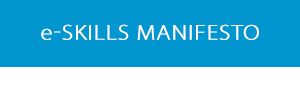ΝΕΑ

06/05/2015
The importance of eSkills to the Digital Single Market
The Commission's Digital Single Market Strategy, launched today by Vice President Andrus Ansip, aims to open up digital opportunities for people and business and enhance Europe's position as a world leader in the digital economy.
Among the priorities, the urgent need to address the eskills gap in Europe has been highlighted. Ninety percent of all jobs already require some level of digital skills. If nothing is done, by 2020 up to 825,000 vacancies could go unfilled in the ICT sector. It is imperative that young generations have the right skills to fill these positions.
The Digital Single Market Strategy hast three main goals: remove barriers, create right infrastructure and conditions to prepare Europe for a digital future. and maximising the growth potential of the digital economy. The latter is on top of the strategy's agenda, provided that citizens have the right skills to seize fully the opportunities offered by the Internet.
"Europe needs to make sure its citizens make full use of the potential of new digital services" underlined EU Commissioner for Digital Economy and Society, Günther H. Oettinger. In its statement the Commission showed to be commited to support an inclusive digital society where citizens can boost their chances of getting a job.
The first reactions to the launch of the Digital Single Market's launch have been positive. The European Coding initiative warmly welcomed the Commission's recognition of the critical importance of ensuring the uptake of digital skills in Europe. In their response, they made some recommendations and motivated the Commission to encourage Member States to urgently reform curricula in order to facilitate the transition from education to work.










